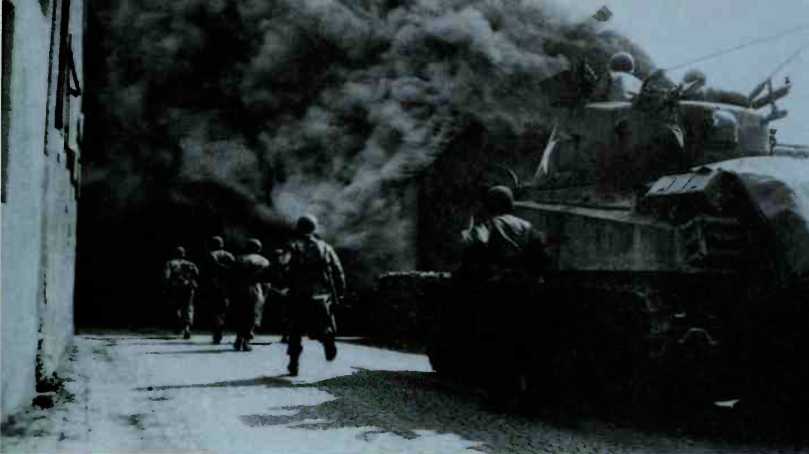Throughout 1942-43, the Germans and Soviets had fought epic battles on Soviet soil. More lives were lost on this eastern front than anywhere else during the war.
Turning the Tide. At the Battle of Stalingrad in late
1942 through early 1943, Soviet defenders stalled what had been a powerful summer offensive by the Germans. In mid-November, the stall turned into a massive counterattack, as the Soviets trapped nearly 300,000 Wehnnacht troops. The raging German tide was finally turned.
In July of 1943, the final German offensive on the eastern front collapsed. At the Battle of Kursk, the largest tank battle of the war, the Soviets used their air superiority to completely thrash the Germans.
Although both sides lost massive amounts of men and materiel, the Germans could no longer replace their losses. The Russians, now being aided by the United States, could. Soviet forces drove the Germans west, into Poland.
By January 1945, massive Russian armies had pushed into Germany itself. By the end of the month. General Georgi Zhukov’s forces had reached the Oder River. There he met the forces of Konstantin Rokos-sovksi. Together, the combined armies turned north, trapping 500,000 German soldiers against the Baltic Sea. The German troops—and more than one million civilian refugees—had to be evacuated by boats.
Allies Move West. As the Russians were marching west, the Allied armies continued to drive relentlessly east, pushing the Germans back to the Rhine. The German Army was caught between two huge and powerful war machines, both moving fast and both aiming a deathblow at Germany’s heart.
As destruction ran riot on the ground. Allied bombers rained it from the air. American and British raids finished off the last of Germany’s industrial targets and smashed German cities, including Dresden.
Of all the Allied bombing raids on Germany, the one on Dresden created the most controversy. Dresden was a stunningly beautiful, historic city with little military or industrial importance. Its only significance as a target was that it was a communications hub, or center, for northern Germany. It had few, if any, bomb shelters.
In February 1945, as refugees from the east flooded into the city, nine Mosquitoes and 796 British
As Allied armies moved east, Allied planes moved ahead of them, smashing German military targets and cities. Facing intense antiaircraft fire, pilots flying these missions had little hope of making it through the war. Quentin Aanenson, a P-47 tighter pilot with the U. S. Ninth Air Force, wrote this letter—but never sent it—to his fiancee.
“Dear Jackie,
“I have purposely not told you much about my world over here, because I thought it might upset you.... I still doubt if you will be able to comprehend it. I don’t think anyone can who has not been through it “I live in a world of death. I have watched my friends die in a variety of violent ways. Sometimes it’s just an engine failure on takeoff resulting in a violent explosive crash.... Other times it’s the deadly flak that tears into a plane. If the pilot is lucky, the flak kills him. But usually he isn’t and he bums to death as the plane spins.... I’ve watched close friends be killed in their parachutes by the German gunners, or worse yet, have their ‘chute catch fire so they just fall helplessly to their death.
“If we aren’t being killed, we are killing. The worst was one mission in late August.... I spotted some German troop trucks loaded with German soldiers... My wing man's guns were jammed, but mine were live and the switches on. They [the German soldiers] never had a chance.... I made three passes, firing until I burned out my gun barrels. [We] counted over 40 separate bodies. I don't know how many more were in the ditches that we couldn’t see. The emotional impact on me was terrible.... I couldn't grip the control stick. I had to land by laying my arm on top of the stick and shifting my left hand back and forth between the throttle and the stick. I have recurring nightmares about that mission. “Yes, there are a lot of things I haven't told you. I haven’t mentioned a mission on
September 6th [when] I was hit by an 88mm shell right behind the cockpit and it almost tore my plane in two. I could look behind me and see sky all around. How the plane held together I don’t know. When I landed, all the plane behind my back armor plate broke off. The control cables dragged the back half of the plane down the runway behind me. When the guys looked at the wreckage, they couldn’t figure out how I got back or how I lived through the landing. Neither could I.
“So far I have done my duty in this war. I have never aborted a mission or failed to dive on a target no matter how intense the flak. I have lived for my dreams for the future, but like everything else around me, my dreams are dying, too. In spite of everything I may live through this war and return to Baton Rouge. But I am not the same person you said goodbye to on May 3rd. No one could go through this and not change. We are all casualties...’’

U. S. soldiers move through a smoke-filled street in Germany. The Allies were closing in on Berlin.
Lancaster bombers attacked in two waves. The planes dropped more than 2,500 tons of bombs on the city. The resulting firestorm killed perhaps 50,000 people. The next day U. S. B-17 bombers struck the city, smashing what little remained of Dresden’s center. Approximately 100,000 people lay dead from the raids, many crushed under tons of rubble. Hundreds of thousands were injured in a city with little or no hope of taking care of them.
Crossing the Rhine. The Germans had hoped to stop
The Allies as they crossed the Rhine River into Germany. They didn't move quickly enough, though, to destroy the Ludendorff Bridge over the Rhine at Remagen. American forces stormed across the bridge on March 7, the first bridgehead over the Rhine.
Other British and American troops followed. The German Army’s resistance was faltering, its supplies drying up. During the middle of April, 300,000 German troops surrendered in the Ruhr Valley.
Defending the Homeland. The Germans, however,
Were still fighting hard on the Eastern Front. The German Army had devastated Russia in its eastern offensives. The Russian Army, the Geimans believed, would now have little mercy on them.
As the Red Army pushed toward Berlin, German soldiers fought to spare their homes and families fi'om what they expected would be unspeakable horrors. As
German troops scratched to hold every acre, hundreds of thousands of German refugees behind them staggered toward the West.
The Red Atmy reached Berlin on April 22, 1945. But it took another ten days of vicious fighting before the city surrendered. Hitler ordered every person to stand to the last in the defense of the city. Young boys were taught to use antitank weapons. Eight out of ten of them would die in the fighting. Anyone refusing to fight was publicly executed.
The Russians, however, would not be stopped by a few civilians. They well remembered the millions of Russians that had died in ditches or stan-ed to death at the hands of the Nazis. They poured their terrible vengeance down on Beiiin. Corpses littered the streets. The smoke from burning tanks and trucks choked the air. Block after city block was reduced to bloody rubble. Berlin became Hitler’s last and most frightful nightmare.
On April 30, as the Red Army fought block to block in Berlin’s last battle. Hitler and his new wife, Eva Braun committed suicide. Their bodies were brought to a clearing outside the bunker whei'e they had lived for the last six months. SS guards doused them with gasoline and set them burning.
The Third Reich—and Hitler himself—were reduced to ashes. After another week of hand-to-hand fighting, Berlin sunended to the Red Armv.




 World History
World History









